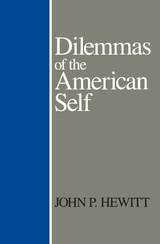

What does it mean to be an American, and how have individual Americans consciously endeavored to create their own identity? "Self-improvement," "self-culture," "self-made man," to "make something of oneself"--all are terms that were used from colonial to Victorian times. The particular language that framed the quest has fallen out of fashion, but it was a powerful cultural imperative for hundreds of years. The quest, in all its "post" guises, continues. Daniel Howe considers the ideas Americans once had about a proper construction of the self. Jonathan Edwards, Benjamin Franklin, Abraham Lincoln, Horace Bushnell, Horace Mann, Margaret Fuller, Henry David Thoreau, Dorothea Dix, Frederick Douglass, among others, engaged in discussion about the composition of human nature, the motivation of human behavior, and what can be done about the social problems these create. They shared a common model of human psychology, in which powerful but base passions must be mastered by reason in the service of virtue. How to accomplish this was often itself a subject of passionate controversy.
The story reveals that Americans both distrusted individual autonomy and were enthusiastic about it; passions, reason, and moral sense collided on how to manage it. Howe is empathetic to all the quests--for elites and artisans, blacks and women--seeing in them a basic pursuit of identity. The author demonstrates that aspirations for "self-control" and "self-discipline," grounded in conservatism and evangelical Christianity, also shaped movements that branched leftward to promote social welfare, feminism, and civil rights.

The outrageous and anarchic sides of Twain play a vital role in his art. But these traits are undervalued even by his admirers, who often favor clean shapes and steady affirmations in Twain's writing - not the dangerous comic outbreak, or the deep yearning to free the self from every definition and confinement.
Reviewing works from a wide range of Twain's writings, Michelson brings to light those wild dimensions, their literary consequences, and their cultural importance.
READERS
Browse our collection.
PUBLISHERS
See BiblioVault's publisher services.
STUDENT SERVICES
Files for college accessibility offices.
UChicago Accessibility Resources
home | accessibility | search | about | contact us
BiblioVault ® 2001 - 2024
The University of Chicago Press









